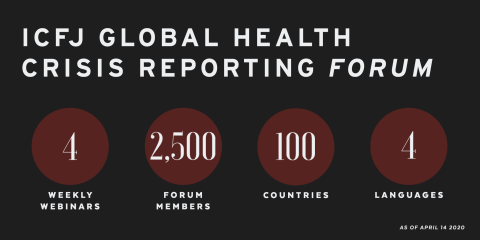
A month ago we formed the Global Health Crisis Reporting Forum to help journalists provide accurate, life-saving information on the COVID-19 pandemic. The response has been overwhelming. Some 2,500 journalists from 100 countries have joined.
The Forum connects journalists with health professionals and other experts through a webinar series. In conjunction with our International Journalists’ Network (IJNet.org), it also provides resources on covering COVID-19 and fosters cross-border collaborations via a Facebook group.
Now, I’m delighted to report, we are significantly expanding our offerings:
- To date, the majority of our Forum activity and our webinars have been in English. I am pleased to share that we will be offering them in three additional languages. Thanks to Google.org, we are adding French, Portuguese and Spanish.
- Also with Google.org’s support, we’re starting up a French edition of IJNet.org, the go-to site for useful information for journalists worldwide -- making French the site’s eighth language. The new edition of IJNet will provide tips, trends and opportunities for French-speaking journalists, with an immediate focus on COVID-19 coverage. This means that we can now reach journalists from Francophone Africa to the Caribbean.
In addition to Google.org, we’re very grateful to Scripps Howard Foundation, Dow Jones Foundation, and the Brooks and Joan Fortune Family Foundation for backing our Forum initiative.
On top of all this, we are launching a global study on the impact of COVID-19 on journalism, in partnership with the Tow Center for Digital Journalism at Columbia University. By surveying journalists on how the crisis is transforming their work, we hope to inform how the field recovers from this devastating crisis.
“From a journalistic standpoint, this is our finest hour,” said Branko Brkic, the founder and editor of The Daily Maverick in South Africa, in a recent ICFJ Forum webinar. “These are the moments where it really counts.”
Indeed, this moment underscores just how much we need journalists. They are playing a key role in informing the public about a pandemic on a scale that we’ve never experienced before. All of us at ICFJ are immensely proud of their work, which often involves risking their own health and well-being.
To those of you who are reporting on the pandemic, thank you for your excellent coverage. To our supporters, thank you for making it possible to better serve journalists at this critical juncture.
Are you a journalist #CoveringCOVID in English, French, Portuguese or Spanish? Sign up for email updates on ICFJ's Global Health Crisis Reporting Forum to be the first to know of new resources.